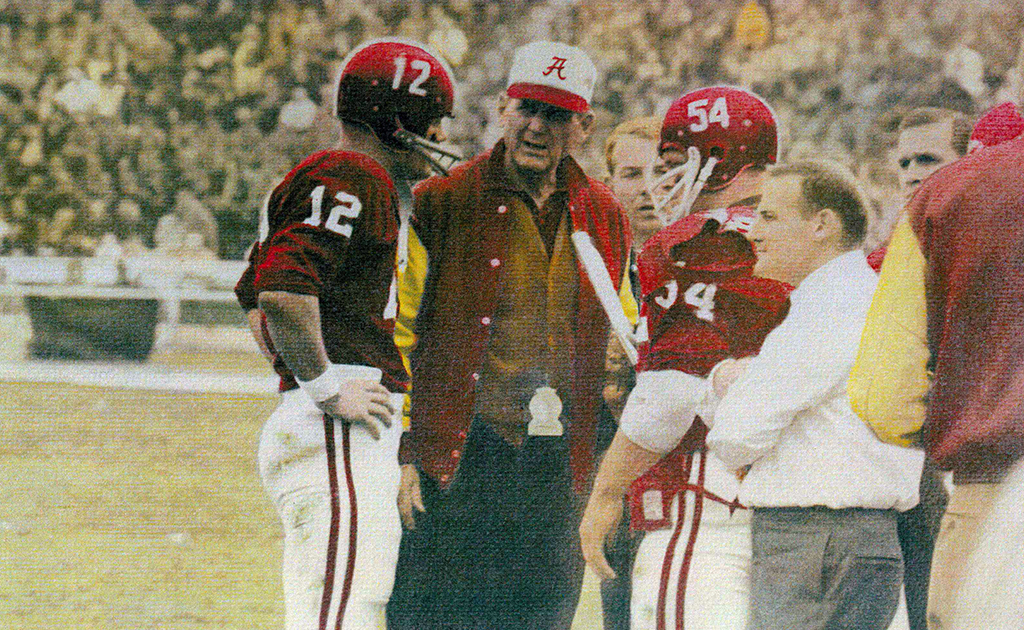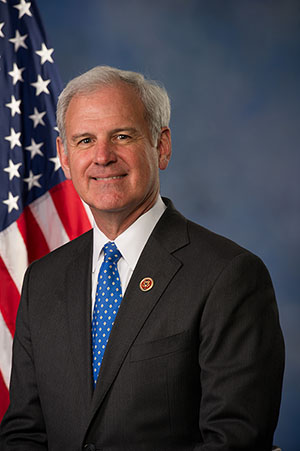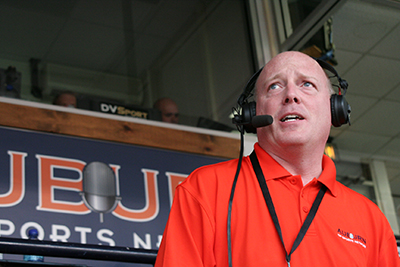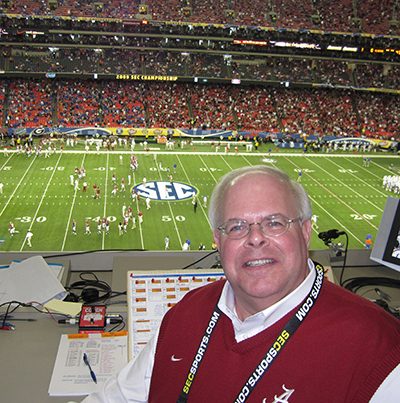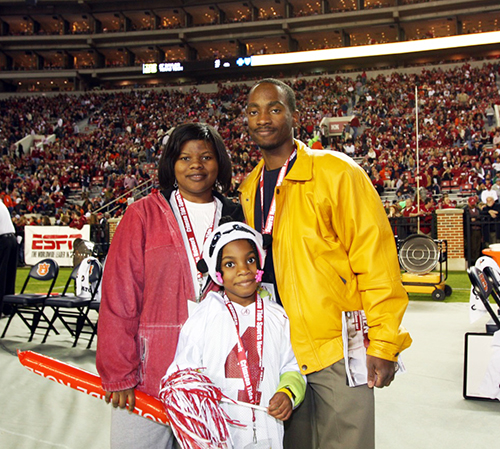For state’s football fans, Iron Bowls inspire memories
By Emmett Burnett
Alabama residency usually includes at least one Iron Bowl memory. For in this state, calling the Alabama–Auburn rivalry a football game is like calling Godzilla a lizard. Both are much more.
Here are a few of the thousands of men and women who bleed crimson when cut or whisper “War Eagle” while sleeping. These are their stories. This is their Iron Bowl.
From 1968-70, Prichard native and Mobile area resident Scott Hunter was quarterback for the Crimson Tide. His coach was Paul “Bear” Bryant, who, shall we say, was opinionated.
“Iron Bowl 1968 is a favorite,” Hunter recalls. “I called timeout, for a sideline conference with Coach Bryant and assistants.” Hunter wanted to run a play action pass but assistant coaches, knowing it had not worked in practice, objected.
The quarterback told Bryant, “Coach, this will work. Let’s run it.” Bryant pushed the assistants aside and replied to Hunter, “OK. If you think it will work, run it.” And as Hunter ran onto Legion Field turf, Bryant shouted, “And by God it better work!”
It did. The Tide won, 24-16.
In a 1981 press conference, newly hired Auburn football coach Pat Dye was asked, “How long will it take to beat Alabama?” He answered, “Sixty minutes.”
“But there’s more to it,” smiles the Auburn icon, who today lives in Notasulga, which is between Auburn and Tallassee. “This guy, unrecognized, shouted his ‘how long’ question from the back of the room. I paused, deliberating my response. Knowing that beating Alabama requires your best the entire game, I answered, ‘60 minutes,’ as a compliment to Alabama. That reporter gave an unfair question and I gave a smart answer.”
One of Dye’s favorite Iron Bowls was 1982, remembered now as “Bo Over the Top.” With two minutes left on the clock, Auburn marched the field and scored with running back Bo Jackson leaping over the defensive line – touchdown and 23-22 victory. “It ended Alabama’s nine-game winning streak,” Dye recalls. “And it was a historical moment for me and Auburn. Since that game, both teams are pretty well matched in wins and losses.”
In 1972, Mobile teenager Bradley Byrne was taking college placement exams. “We took a break,” recalls Byrne, now a University of Alabama graduate and U.S. Congressman representing House District 1. “Someone turned on a TV to the Iron Bowl. I felt good because we were winning 16-0.” After completing tests, Byrne checked the score again. “We lost 17–16? It took me a long time to receive an acceptable explanation of just how that happened.”
But the congressman has witnessed many Bama victories since then, watching with wife Rebecca. Unfortunately, like the Congress he serves, the House of Byrne is a house divided. Rebecca Byrne attended Auburn.
 Former state representative Barry Mask was the first Aubie, mascot of the Auburn Tigers. In the 1979 Iron Bowl, the Wetumpka area resident-as-Aubie was photographed mimicking Alabama’s Coach Paul “Bear” Bryant. The tiger and the Bear both leaned against a goal post, each outfitted in houndstooth hats and blazers, before cheering thousands. “But Coach Bryant didn’t see me,” says Mask. Then he turned around, did a double-take, and approached the Auburn tiger.
Former state representative Barry Mask was the first Aubie, mascot of the Auburn Tigers. In the 1979 Iron Bowl, the Wetumpka area resident-as-Aubie was photographed mimicking Alabama’s Coach Paul “Bear” Bryant. The tiger and the Bear both leaned against a goal post, each outfitted in houndstooth hats and blazers, before cheering thousands. “But Coach Bryant didn’t see me,” says Mask. Then he turned around, did a double-take, and approached the Auburn tiger.
“Face to face I looked into those steel blue eyes not knowing what to expect,” recalls the mascot. Finally, breaking his intense stare, the famous coach pointed at Aubie’s head, chuckled and said, “Nice hat.”
Among the most famous Iron Bowl games are the “Punt Bama Punt,” the 1972 contest; “Bo Over the Top” in 1982; and Iron Bowl 2013, the most famous second in football history.
Auburn sportscaster Rod Bramblett helped made that second famous. The New York Times calls his play-by-play broadcast “The Call of a Lifetime.” With one second left, and a 109-yard missed kick runback, Auburn won 34-28.
“Holy cow!!! Oh my God!!!…Auburn wins!!! Auburn has won the Iron Bowl!!!” Bramblett’s words blared over almost every radio in the state. Like many, he had trouble believing it.
“I heard the replays the next day just like everyone else,” he recalls. “It took a while to sink in. I kept thinking, ‘Did that really happen?’”
“I am glad the broadcast contributed to putting Auburn in a positive light,” he says. And as for the famous last seconds, Bramblett laughs, “I probably need some new material. But that call has been very good to me.”
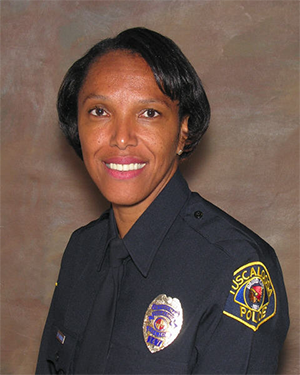 Tuscaloosa’s Lillie Leatherwood seldom saw Iron Bowl games during her 1983–87 Capstone years. She was busy training and running track, which won her an Olympic Gold Medal. “But during practices, I was glued to the TV for the Iron Bowl,” she says. “And I will always love the Van Tiffin kick” in 1985, when Alabama kicker Van Tiffin made a 52-yard field goal with zero time remaining. Alabama won 25–23.
Tuscaloosa’s Lillie Leatherwood seldom saw Iron Bowl games during her 1983–87 Capstone years. She was busy training and running track, which won her an Olympic Gold Medal. “But during practices, I was glued to the TV for the Iron Bowl,” she says. “And I will always love the Van Tiffin kick” in 1985, when Alabama kicker Van Tiffin made a 52-yard field goal with zero time remaining. Alabama won 25–23.
As a Tuscaloosa Police officer, she has worked crowd control on Iron Bowl Saturdays. “People expect automobile traffic to be heavy,” she says. “But the foot traffic around the stadium is amazing. It is a sea of people.”
Rick Smith witnessed an Iron Bowl miracle. In the 1970s he recalls sitting in Legion Field during a storm. “I noticed Coach Bryant peering at the sky,” the Foley resident said. “Lo and behold, almost immediately the rain stopped!” After the game, Smith noticed Coach Bryant again, gazing at clouds. “The rains returned as we drove home,” says Smith, who thought, “Coach Bryant really can part the waters!”
Weather was a defining memory for Regina Coleman, a former Auburn student and avid Auburn fan. “I remember an Iron Bowl played at Legion Field back during the late ‘70s, or possibly the ‘80s, when my husband and I sat in the upper deck, while waiting for a tornado watch to lift. Memories of this Iron Bowl were mainly (of a) torrential downpour and prayers of, ‘please keep us safe.’ Auburn did win in a squeaker, but mostly I was just thankful to make it out of the stadium alive and in one piece.”
And yes, we can get along. Gadsden resident and Auburn fan Mike Fisher shared a Sugar Bowl skybox game with an Alabama fan-friend, courtesy of business associate tickets. Returning the favor, Fisher’s Crimson Tide buddy invited him to a 50-yard line 1993 Iron Bowl visit, courtesy of the friend’s employer. “It isn’t often Auburn and Alabama fans share their fondest football memories together,” Fisher says. Sharing them from a cushy skybox doesn’t hurt either.
Crimson Tide sports announcer Eli Gold is hard pressed to pick a favorite game. “Anytime Alabama wins is my choice,” he says. “The most memorable ones for me are any leading to national championships.”
But Gold perhaps sums the Iron Bowl best. “I have had the pleasure and luxury to broadcast many college and NFL games,” he says. “They are good, many are excellent, but different from the atmosphere and excitement of the Iron Bowl.”
He continues, “The Iron Bowl is the best and biggest. The teams are always nationally ranked and the entire state revolves around the game, year in and year out. It is the best college rivalry there is. Period.”
We agree. Roll Tide and War Eagle. Period.
A rivalry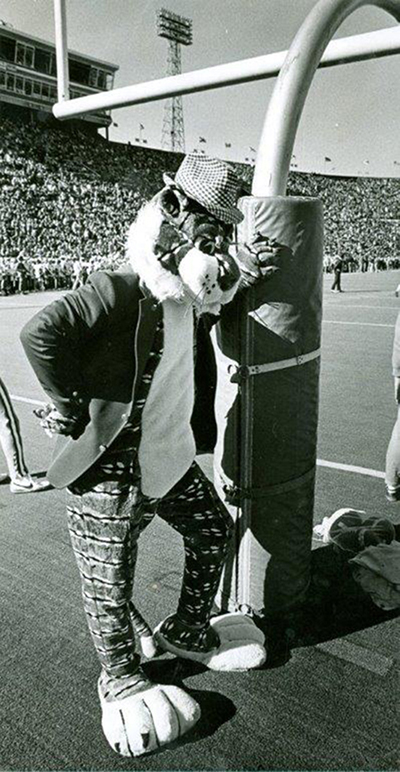 ’s history
’s history
The first Iron Bowl was played in Birmingham’s Lakeview Park on Feb. 22, 1893, when Auburn won, 32-22. The inaugural game drew less than 5,000 people.
Contrast that to Iron Bowl 2014. With 100,000-plus in attendance, Tuscaloosa’s Bryant-Den
ny Stadium held more people than the combined population of Dothan and Selma.
The title “Iron Bowl” is credited to Auburn’s legendary football coach, Ralph “Shug” Jordan, as a reference to Birmingham, the “Iron City” game’s host. Ironically, later, Auburn vigorously lobbied to move the game from Birmingham to the school’s Jordan-Hare Stadium. This is the same stadium partially named for Jordan, who named the game for Birmingham, the city Auburn moved the game out of. Confused yet?
Alabama and Auburn fans have encountered many disagreements over the years. But today’s game is almost genteel compared to the early ones. The early 1900s rivalry was plagued with accusations of bias, misappropriations of funding, contract disputes and coaching arguments.
Each team’s supporters accused the other of ill-gotten deeds of dubious means. Enough was enough. In 1907, the gridiron contest was suspended until Alabama and Auburn could compromise, restore peace, and quit bickering. It took them 41 years.
The game resumed in 1948.
Incidentally, Coach Paul “Bear” Bryant suggested the contest by referred to as “the Brag Bowl,” because winning team fans, for the next 364 days, miss no opportunity informing losing team fans of the final score.
Denice and Nehemiah Mitchell of Smiths Station aren’t big sports fanatics, but after their oldest child, Moriah, won tickets and sideline passes for the 2014 Iron Bowl, the family showed their Crimson Tide allegiance and helped celebrate their little girl’s big accomplishment.
Moriah, a pupil at West Smiths Station Elementary School, won the “Be A Champion and Read” contest, designed to promote reading in Alabama’s public schools. The grand prize: tickets to the big game! Moriah is a big Tide fan, and was happy to put on her crimson and white for the Iron
Bowl in Tuscaloosa.
There, Moriah walked among the tailgaters, took pictu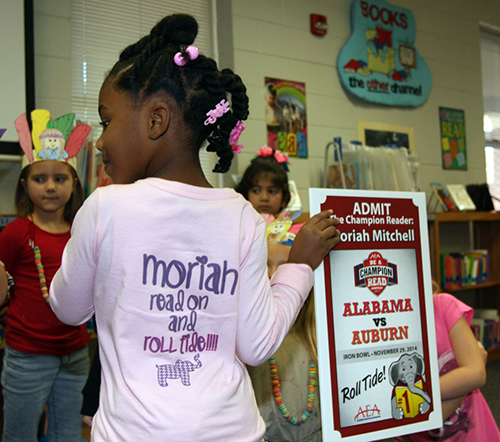 res with the schools’ cheerleaders and got a hug from Big Al (she even agreed to a picture with Aubie).
res with the schools’ cheerleaders and got a hug from Big Al (she even agreed to a picture with Aubie).
“We will never forget the 2014 Iron Bowl, the year Alabama defeated Auburn, which was the cherry on top for our little Bama girl,” her mother, Denice, says.
